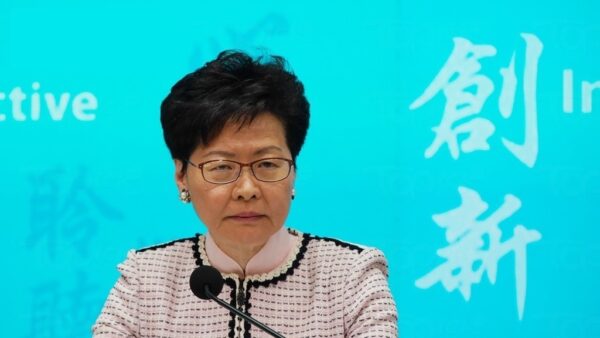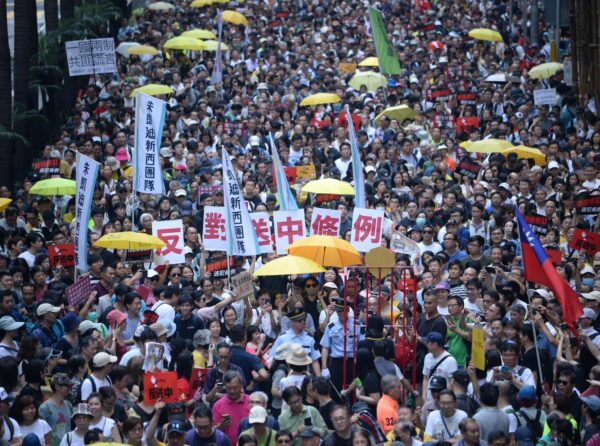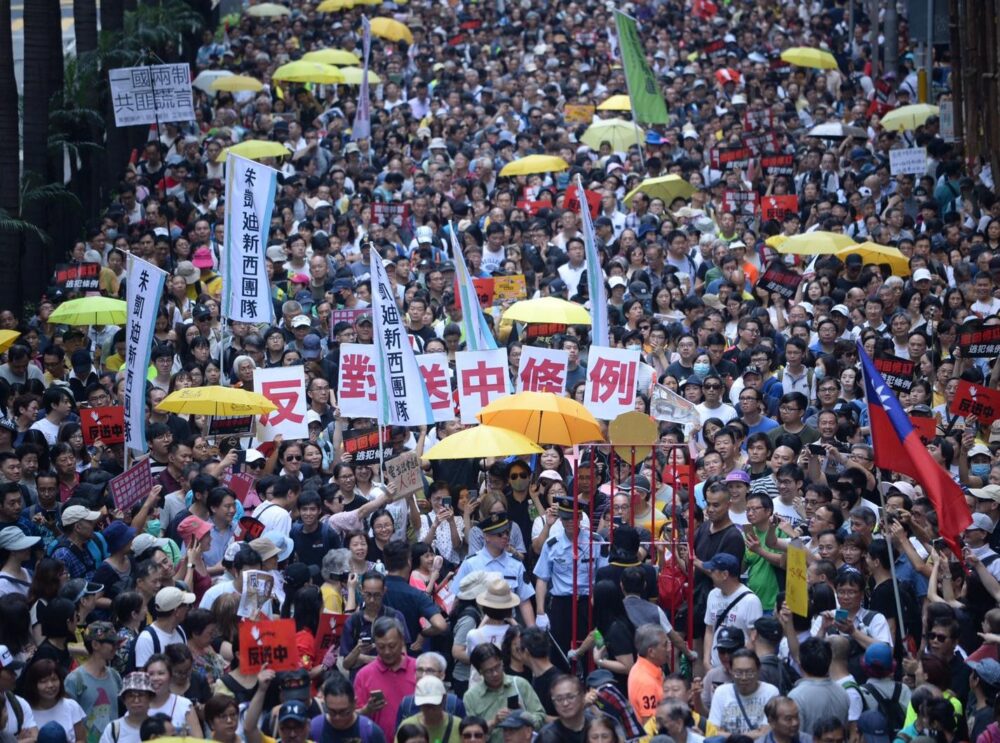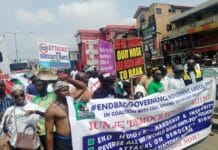If Hong Kong’s democracy movement is to succeed it must spread to mainland China and connect with the mainland masses, especially the working class, to jointly fight the dictatorship and capitalism
Editorial of the 52nd issue of Socialist, bimonthly magazine of Socialist Action (CWI Hong Kong)
Carrie Lam’s government is continuing to attack democratic rights and trying to assert its control over Hong Kong’s pro-CCP factions (CCP = Chinese Communist Party), but at the same time these policies are more and more creating a dilemma.
Almost every month, the government’s new policies attract fierce criticism from the opposition and even sections of the pro-Beijing establishment. This is a dangerous situation for the ruling class as its own factional infighting can encourage the masses to re-launch a powerful anti-government movement.
The collusion between the government and big business is clearly on display in the controversy over the extradition law, which the government wants to amend in order to be able to deliver fugitives to the Chinese dictatorship. This is banned under the existing law and the proposed changes represent a serious threat to democratic rights in Hong Kong.
In pushing for its amendments, the government has met opposition not only from pro-democracy forces but even capitalists who are afraid of being extradited for economic crimes committed in the mainland China. Although big business groups have turned to support the amendments, following some government concessions, their distrust of Carrie Lam’s administration will remain and deepen.
The regime in Hong Kong is different from that of the CCP regime in China, due to the so-called “one country, two systems” policy which was designed to reassure Hong Kong capitalists for the handover in 1997. More recently, this arrangement has been weakened by Xi Jinping’s regime, which stands for centralisation and fears losing control of China’s complicated patchwork of regions and rival factions.
The Hong Kong government is a slave to the interests of big capital, while the CCP has an authoritarian apparatus that enables it to subordinate and suppress the capitalists when this is necessary for regime survival, instead of vice versa. Ultimately, of course, the CCP’s policies serve the interests of capitalism in China.
In the battle over the extradition law, it first seemed that Carrie Lam herself, rather than Beijing, initiated the amendments in an attempt to ward off the pressure from CCP hardliners such as the faction around former Chief Executive Leung Chun-ying. The hardliners are maintaining constant pressure on her government to enact Article 23 legislation for “national security” as soon as possible. However, now even the Chinese regime believes the Hong Kong government must not back down in this battle, otherwise its authority will be weakened and further crackdowns in the future could be more difficult.

Highest authority
Recently Lam submitted a report as requested by Beijing about banning the Hong Kong National Party, a one-member pro-independence party. This procedure is intended to set a precedent – to show the Chief Executive is directly answerable for carrying out the CCP’s orders.
Article 48 of the Basic Law, Hong Kong’s mini-constitution, says the Chief Executive can directly execute orders on behalf of the Beijing government, which means in such cases the ‘executive power’ i.e. Lam’s government will have the higher authority over other state organs (parliament and courts) within Hong Kong’s capitalist political system and will not be subject to their “checks and balances”.
This means that even if a judicial review is conducted in extradition cases, the court will regard the central government as the highest authority. The logic of these moves is to further concentrate power in the hands of Chief Executive, breaking the old power landscape within the progovernment camp and removing the “democratic” garnish used to reassure the masses. This approach corresponds to what the former Chief Executive Leung Chun-ying called the “super-dominant status of the Chief Executive” and what Xi Jinping calls “overall jurisdiction” (over Hong Kong by the CCP regime).
Recently the director of the Liaison Office, the CCP’s extended arm in Hong Kong, arrogantly said there is only “one country” and no “two systems”, when talking about “national security”. There are now reports saying China’s fig-leaf parliament, the National People’s Congress (NPC), may deliver an “interpretation” of Article 23 in order to force the pace of legislation. This is despite the fact that Hong Kong’s pro-government parties have the necessary votes in the Legislative Council (Legco), given their rigged majority, to pass Article 23 without Beijing’s “help”.
Power struggles of this type are set to increase, worsening the conflict between sections of the pro-government camp and the government. At the beginning of this year when Lam raised the age threshold for the Comprehensive Social Security Assistance (welfare subsidies) for the elderly, some pro-government politicians accused her of superciliousness and “alienating the pro-government parties more and more from her government”.
These conflicts between the government and pro-government parties can embolden the city’s pro-democracy forces, but it would be fatal to have illusions in any faction of the ruling group or the big business interests behind them. They are unhappy over Carrie Lam’s centralisation of power, but are even more afraid of mass movements to destroy their dominance. Their double-dealing role was shown in the battle over the extradition law. At first, some pro-government parties questioned the proposed amendments. However, after Lam made concession to the business sector and removed nine economic crimes from the list of extradition offences, the pro-government parties have basically fallen into line.
Only a faction of the Liberal Party led by James Tien Pei-chun, representing the small capitalists in Hong Kong, still demands the amendments be withdrawn or that only those accused of serious crimes leading to imprisonment for seven years or above can be extradited. Three of the Liberals’ four legislators are likely to vote against the amendments, causing some uncertainty about whether the amendments can be passed. This dispute reflects wider grievances: Local capitalists in Hong Kong represented by Tien’s faction are uneasy over the influx of mainland Chinese capital. Tien has previously stood up to the regime (for example, in the Chief Executive “election” in 2012, Tien opposed Leung Chun-ying who had the CCP’s support), so this grouping has been marginalised by the CCP and Hong Kong government, and are seen as unreliable among pro-CCP forces.
The government’s political crackdown is now like a machine that they themselves cannot stop. The government has to adopt a more and more repressive form of rule whether this is conducive to stable rule or not. This is not only due to the local political set up, but more importantly due to the CCP regime, which is escalating repression in mainland China and will not allow Hong Kong to stand out as a “democratic enclave”.
Due to repeated retreats by the pan-democrats, and with the endorsement by Xi Jinping regime, Carrie Lam government seems to be full of confidence. Her government has pushed for the conviction of nine supposed leaders of the Umbrella Movement, the draconian National Anthem Law, the amendments to the extradition law – all at the same time. The only force that can stop the repressive machine is a coordinated mass fightback.

Lack of alternative
Undoubtedly, the failure of the Umbrella Movement in 2014 still affects the consciousness of the masses. At the same time, the masses also feel “the CCP dictatorship is too powerful” to defeat and so lacks confidence that it is possible to win. But every time the government introduces pro-rich or authoritarian policies the masses react immediately, expressing righteous indignation and continuing to take to the streets.
In the final analysis, the current stalemate in the mass democracy struggle and the complicated mood, combining anger and a sense of helplessness, are caused by the weakness and political failings of the pan-democratic leadership. The pan-democrats can’t break with capitalism. Under the pressure of the capitalists, whose economic leadership the pan-democrats accept as Holy Scripture, they refuse to directly confront the authoritarian regime with an organised mass movement, let alone a workers’ movement, so the struggle lacks a militant alternative.
During the pre-Umbrella Movement period, when the mood of the masses was still rising, this pressure forced the ‘moderate’ pan-democrats to participate in the mass struggle – they were afraid the masses’ radicalisation would sweep them aside and therefore tried to impose control on that struggle and limit it. As the three alleged leaders of ‘Occupy Central’ recently admitted during their trial, the Umbrella Movement was completely unexpected on their part and they wanted to end the movement as quickly as possible.
Today, the most radical forces in the pro-democracy struggle have been severely suppressed by the government. The pan-democrats consequently face less competition and their conservative character and weakness has become clearer.
Now, for the first time since Carrie Lam took office, the Democratic Party, the largest pro-democracy party, has called for Lam’s resignation. This shows the enormous backlash caused by the amendments to the extradition law and the pressure this has put upon the moderate pan-democrats. The pan-democrats mainly want to win electoral support in this year’s district council elections (to be held in November) by opposing the amendments, instead of waging a real struggle.
Despite the foot-dragging of the moderate pan-democrats, the number of protesters on the March 31 demonstration against the amended law exceeded 10,000, far above the pan-democrats’ expectations. However, when more radical democrats called for a second demonstration on April 28, the moderate pan-democrats once again expressed no confidence in mobilisation, fearing that a low turnout would “show weakness”. In this way they project their own weakness onto the masses. It is the pan-democrats who do not have the ability to fight because they have no political solution to defeat the CCP dictatorship. They understand no other method than “compromise” and make one retreat after another when the CCP keeps its hard-line stance.
Uniting with mainland masses
In this struggle left-wing and workers’ organisations need to be politically independent of these leaders, arguing for the broadest unity in mass struggles of all who want to fight the authoritarian regime, but challenging at every step the timid, conciliatory pro-capitalist stance of the pan-democrats. The key force to achieve this political re-armament of the democracy struggle would be a new mass workers’ party, with democratic structures and a socialist programme for immediate and full democracy including – crucially – ending the rule of the tycoons.
If Hong Kong’s democracy movement is to succeed it must spread to mainland China and connect with the mainland masses, especially the working class, to jointly fight the dictatorship and capitalism. This is not even a “China” struggle but an international struggle. The struggle for democracy is also a struggle against capitalism and for a working class alternative.




